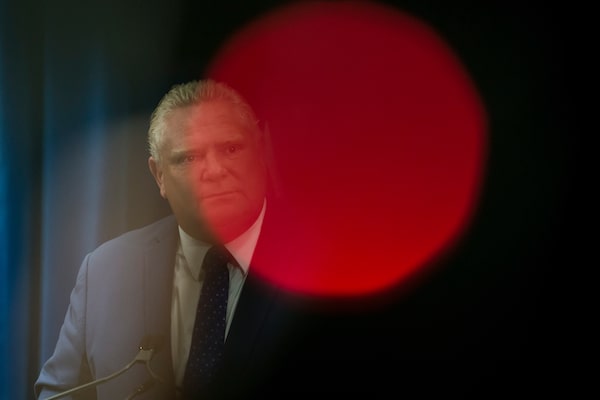
Ontario Premier Doug Ford speaks to reporters in Toronto, on Sept. 10, 2018.Christopher Katsarov/The Canadian Press
Talk to Progressive Conservatives around Doug Ford’s government about the Ontario Premier’s hijacking of municipal elections, and you’ll likely encounter bemusement.
They did not anticipate that a top priority after taking office would be dramatically shrinking the number of city council seats in Toronto, with local campaigns already under way. They’re unsure why it’s so urgent that, after Monday’s court ruling that the changes are unconstitutional, Mr. Ford immediately went nuclear by invoking the notwithstanding clause. But if this is not what they signed up for, they can live with it, so long as they get to pursue less peculiar agenda items.
At some point, they will need to come to terms with the fact that this week’s bedlam is exactly what they signed up for when they went to work for a chaos agent. And the way this drama has played out shows they can’t will him to be something else – no matter what they told themselves when they embraced Mr. Ford after he won their leadership last winter, helped him get elected in the spring and accepted offers to serve as ministers or staff.
For a little while, they did better than reasonably expected at getting him to meet normal expectations for a party leader.
There were glimpses of disorderliness before Ontario’s June election – Mr. Ford breaking political financing rules by attending a fundraiser, displaying ignorance of the government he sought to lead, being embarrassed by a financial dispute with his brother’s widow. But he mostly left his fate in the hands of advisers who plotted a low-risk campaign.
The relative discipline briefly continued postelection. The summer’s legislative sitting was never going to be smooth sailing, with a novice Education Minister stumbling through her boss’s promised sex-education rollback, or a mad rush to wind down the previous government’s clean-energy incentives. But the Tories were largely delivering on campaign commitments, and Mr. Ford seemed to be continuing his efforts to reassure Ontarians he was more reasonable than his advance billing.
That lasted until a month after his swearing-in, when Mr. Ford reminded all concerned whom they were dealing with.
Some of Mr. Ford’s ministers and aides thought they had dissuaded him from immediately slashing Toronto’s council – an idea he raised internally shortly after his election win. They hadn’t campaigned on doing so, it wasn’t on supporters’ radar and there was no reason it couldn’t wait rather than pulling the rug out from under candidates already campaigning. It risked raising concern about his impetuousness, even among voters not directly affected.
What they overlooked was that Mr. Ford likes demonstrating he has the power to turn things upside down as he sees fit. He proved that by announcing the Toronto council cuts hours before the deadline for candidate registration. Then this week, he proved it again.
Monday’s Ontario Superior Court ruling offered Mr. Ford a chance to reaffirm some commitment to responsible governance. Lacking enough time this fall to rely on the appeals process, he could have said that while he disagrees with the finding that the election changes violated Charter-protected freedom of expression, he would settle for getting changes in place by the next municipal elections, in 2022. But what fun would that be?
What has happened instead – Mr. Ford becoming the first premier in Ontario’s history to invoke the notwithstanding clause – might look familiar to anyone who watched his family’s act when his brother Rob was Toronto’s mayor, and Doug was a councillor.
But there is a useful distinction to be made, between the chaos then and now. Under Rob Ford, it had to do with lack of control over personal demons, and over council. Under Doug Ford, it has to do with asserting the massive control that comes with leading a majority government.
The changes to Toronto’s electoral map were plainly about settling scores from his city hall days. To do so, he exploited provincial control over municipalities in a way other premiers have not. Now, he has gone to war with the judiciary, using a tool others shunned when they had better cause to consider it.
There is zero reason to believe this is a blip, because it’s consistent with Mr. Ford’s combativeness when he was a councillor. And the more that he settles into his job, the more he realizes how few checks there are, the more he’s likely to keep testing his limits – as evidenced by his boast that he won’t hesitate to use the notwithstanding clause again.
That could change if his caucus proves less pliant. But in the foreseeable future, even establishment types – including Caroline Mulroney, the Attorney-General along for the ride this week – won’t stand up to the first Ontario PC Leader to win an election this century.
If the chaos eventually proves exhausting to voters, as chaos tends to, Mr. Ford’s loyal soldiers might reconsider what they’ve gotten themselves into. For now, bemusement is more inviting.
 Adam Radwanski
Adam Radwanski